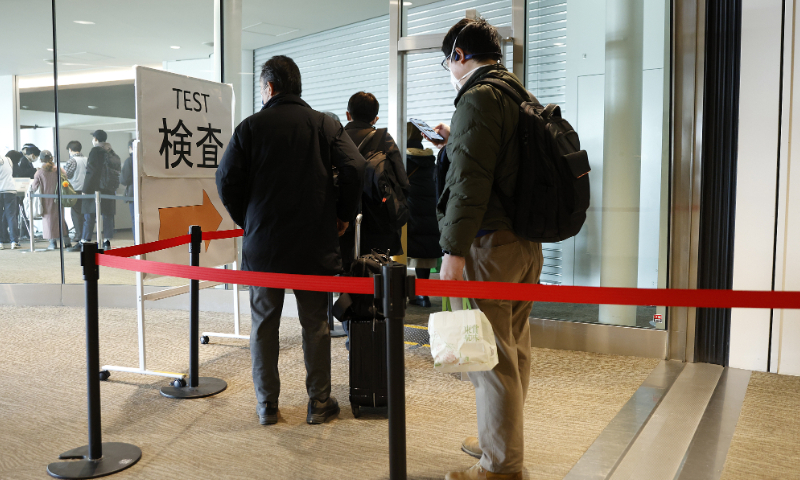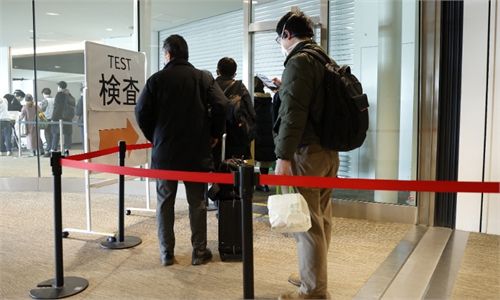
Arriving travelers from Shanghai, China, line for COVID-19 tests at Narita International Airport in Narita, Chiba Prefecture, Japan, on December 30, 2022. Photo: VCG
Since the outbreak of the COVID-19 pandemic three years ago, China has adjusted its epidemic prevention and control policies in light of the evolving situation, and effectively responded to the uncertainty with scientific and flexible measures. Since January 8, 2023, China has downgraded its management of COVID-19 from Class A to Class B and implemented an optimization policy for entry and exit, which has been generally supported and welcomed by the international community.
However, a few countries including Japan and South Korea have tightened their entry policies against China for purely political purposes, as part of a negative publicity campaign against China. This is not conducive to the world's overall recovery in the post-epidemic era.
Take Japan. From requiring COVID-19 tests for all passengers arriving from China to testing negative within 72 hours of departure, and from limiting flights to giving travelers from China a red card, Japan has adopted discriminatory and restrictive measures and harmed the legitimate rights and interests of Chinese citizens traveling to Japan. This has hindered the two countries' normal personnel exchanges and has a negative impact on China-Japan relations. China has taken reciprocal measures and suspended the issuance of ordinary visas for Japanese citizens who wants to travel to China.
Japan's actions reflect its double standards. It treats the US and China differently in terms of epidemic prevention policies. The COVID variant XBB.1.5 has spread rapidly in the US recently, accounting for more than 40 percent of cases in the US, and the WHO has recognized it as the most transmissible subvariant yet. But the Japanese government has turned a blind eye to it. Instead of focusing on preventing the virus coming in from the US, the Japanese government has pointed its finger at China.
Japan's stance on China's epidemic prevention policy is contradictory. When Chinese and Japanese leaders held their meeting in Thailand in November 2022, Japanese Prime Minister Fumio Kishida claimed that Japan hoped China would relax its epidemic prevention measures, according to media reports. But after more than a month when China announced the orderly resumption of personnel exchanges between China and other countries and regions, the Japanese government has imposed restrictions on the entry of China arrivals under the guise of preventing large-scale imported cases. This fully shows that Japan says one thing and does another.
Japan's tightening of anti-epidemic measures against China serves its own political interests, rather than those of Japanese people. First, the support rate of the Kishida administration has decreased due to multiple factors including ineffective epidemic prevention and control, continued economic downturn, the "Unification Church" issue and resignations of cabinet members. By adopting discriminatory epidemic prevention and control measures against China, Japan's real purpose is to shift its governance woes, reshape its so-called responsible image of protecting the health of Japanese citizens, so as to please its own people.
Japan's acts against China also seek to actively obey the US. Since the optimization of China's epidemic prevention policy, the US has slandered China by hyping the so-called lack of transparency in sharing epidemic information, and has imposed restrictions on China arrivals. Japan has echoed the US on the issue, aiming at demonstrating the cohesion of the US-Japan alliance in exchange for the US' substantial support for the transformation of Japan's security strategy.
Epidemic prevention and control is a global issue that should be tackled by all mankind together, instead of a geopolitical tool for specific countries. As close neighbors and important countries in Asia and the world, China and Japan jointly shoulder the important responsibility of maintaining international and regional peace and prosperity.
The Japanese side should clearly understand the overall situation of China-Japan relations, correct its discriminatory entry policy and work with China to promote the development of bilateral relations, lead the global economic recovery after the epidemic, and make positive efforts to benefit people in the region.
The author is a scholar at the Department for Asia-Pacific Studies at the China Institute of International Studies. opinion@globaltimes.com.cn


